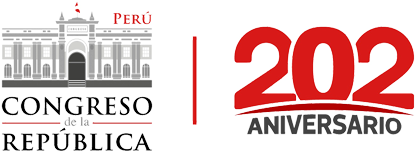“Año de la recuperación y consolidación de la economía peruana”
“Year of the Recovery and Consolidation of the Peruvian Economy”
“Jahr des Aufswungs und der Konsolidierung der peruanischen Wirtschaft”
“Année de la reprise et de la consolidation de l'économie péruvienne”
“Peru mamallaqtapaq qullqi kausarichiypaq, sinchiyachina wata”
FUNCTIONS
The Congress is the branch of government representing the Nation. The duties of the Congress are as follows: the representation of the Nation, the adoption of laws, the permanent oversight and political control of the Executive Branch. This is all aimed towards the social, political and economic development of our country, as well as the incidental reform of the Constitution, among other special functions.
Legislative Function
The legislative function includes the debate and adoption of reforms of the Constitution, laws, and legislative resolutions, as well as their interpretation, amendment, and repeal, pursuant to the procedures established by the Constitution and the Standing Rules of Congress.
Political Control Function
This function includes the investiture of the Cabinet, the political debate, the conduction of acts and inquiries, and the approval of agreements on the political conduct of the Government, the acts of the public administration and the authorities of the State, the authorization of the delegation of legislative faculties to the Executive branch, the issuance of emergency decrees, and the supervision on the use and disposal of public assets and resources, and the delivery of the annual address by the President of the Republic, the impeachment procedure, law enforcement, and appropriately holding lawbreakers to account before a court of law
Special Functions
The special functions of Congress are to appoint the Comptroller General of the Republic, the Ombudsman, as well as the members of the Constitutional Court, the Directorate of the Central Reserve Bank; and ratify the Chair of the Central Reserve Bank, and the Superintendent of Banking and Insurance. It oversees the removal of high-rank officials as prescribed in the Constitution.
SOURCE: Parliamentary General Directorate






